|

|
 click to download a pdf of the syllabus

*Information contained in this syllabus, other than that mandated by the University, may be subject to change with advance notice, as deemed appropriate by the instructor."
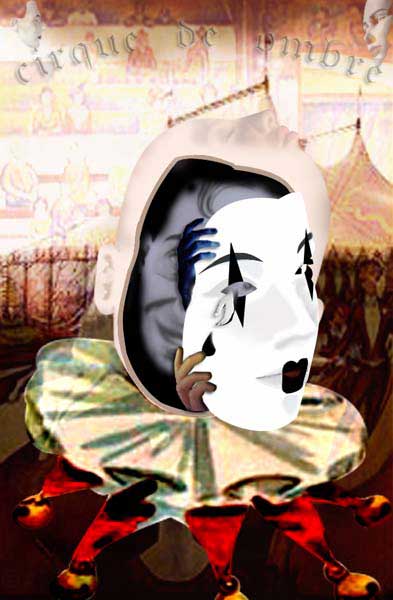
|
Two hours lecture and two hours activity per week.
An introductory survey of visual technologies commonly used by artists and designers. Projects explore software applications as they relate to current methods of digital art production. Emphasis is on the development of fundamental computer skills and an understanding of the relationship between digital media and visual design. This course covers the basic computer skills, concepts, and essential software needed to work successfully in the “visual technology” fields of graphic design, computer animation and interactive media creating imagery for both print and the web. This class will help develop a fundamental yet solid understanding of how computer graphics work and are developed and will include digital image concepts such as vector and raster images, color modes and key graphic design elements. Students will learn the use of general computer skills such as file organization for projects, keyboard shortcuts, using local area networks/servers, and using proper file suffixes. The two software programs used in this course are Adobe Photoshop & Adobe Illustrator.
Upon completion of the course the student will:
- Have a solid understanding of the software programs Adobe Photoshop and Adobe Illustrator
- Understand the program’s keyboard shortcuts, drawing, painting, design and selection tools
- Utilize selection tools to isolate areas of the image for editing
- Utilize painting tools and be able to perform basic image retouching edit and color correct images, using color modes, channels, Levels and Color Balance.
- Understand Image Resolution
- Understand and work easily with layers and adjustment layers
- Use the Pen tool to create and edit vector paths
- Understand layer effects and filters
- Work easily with layer masks, the shape tool, the pen tool, gradients and type
- Be able to import images into the computer using scanning software, digital cameras, and using other art resources (e.g. online stock art) for manipulation
Through studio projects involving technical demonstrations, artistic exercises, discussions and critiques students will accomplish the following:
- Explore artistic concepts involved in the development of ideas and the production of digitally produced images/projects created utilizing emerging technologies
- Develop a familiarity with the high-tech environment while working with specialized art software
- Learn to place emphasis on understanding software and articulating their conscious intentions, and coherent aesthetics
- Express personal ideas and opinions through the artistic process
- Experience individual artistic growth through projects involving concept and technique.
- Develop technically proficient and intellectually sound individual projects
- Begin preparation leading towards a career as an artist working in computer graphics.
The basics of computer graphics/computer graphics terminology
- Collection and the creation of imagery, which will include personal artwork in combination with other sources such as:
- Drawings
- Photography and stock photography
- Painting
- Sculpture
- Printed matter
- Found objects
- Discussion of Artistic concepts such as:
- Composition
- Color Palette
- Perspective
- Light and shadow
- Familiarity with Computer Hardware and Saving Files:
- Saving files with proper file organization
- Saving files for print and for the web
- Presentation and class critique of projects.
- Photoshop documents (.psd files)
- Illustrator documents (.ai files)
- Printing images for presentation in a gallery show or for a physical or digital portfolio (Big Shots Digital)
Your final student grade in this course will be based on a combination of homework and in-class assignments, the watching of Lynda.com videos, class participation and attendance.
Your performance will be evaluated by: your ability to successfully complete a series of assignments on time (as if I was a real client expecting a completed job).
I DO NOT accept e-mailed assignments and you are expected to complete all assignments.
Full class attendance and participation is required and has a significant effect on a student's success:
- Excessive absences as well as consistently arriving late to class will have a negative effect on the overall grade and can lead to a failing grade in the course.
- Students arriving after the classes has started and I have taken roll are considered tardy.
- If you have 3 or more unexcused absences your overall grade will be lowered one full grade level, and if you are tardy 3 times this will equal 1 unexcused absence. This is cumulative.
tip: Make friends with someone in the class in case you are absent so that you can find out what was covered in the class.
Participation in the class – means:
- Engage the professor and the other students in discussion.
- Listen attentively.
- Ask the professor to repeat a concept, theory, or idea.
- Bring in interesting imagery, resource websites or articles or news relevant to the class material that might be of interest to all the students.
- Attend class and willingly involve yourself in the class activities.
- Be prepared to make constructive and thoughtful comments during class critiques.
Art 108 final exam* (critique) is Wednesday, December 14, 8:00-10:00 AM in Topanga 1976
*Attendance is mandatory for the final critique--non-attendance as well as being late can lead to a lowered or failing grade for the final project.
All assignments should be submitted in class on the specified due date. If the assignment is due at the beginning of class (i.e. 10am) anything after that is considered late. Late work will automatically be lowered one full grade level.
You may re-submit one assignment to be consideration for a higher grade, please consult with the professor if you plan to do this.
Please see this website for policies and regulations regarding Academic Dishonesty:
http://www.csuci.edu/academics/catalog/2007-2008/12_policiesandregulations/50_academicdishonesty.htm
*Additionally, all work turned in for this course must be original work for this course and may not be submitted for other courses currently being taken or have been turned in for previously taken courses.
PROGRAM POLICY ON OWNERSHIP, COPYRIGHT, SALE AND STORAGE OF STUDENT ARTWORK
In accordance with CI Senate Policy SP 06-18 Policy on Intellectual Property: Ownership of Student Artwork Students retain ownership of tangible, physical artworks (objects) they create in their courses at CI, unless the Art Program/University has provided extraordinary funding, materials or other resources involved in the production or fabrication of the artwork. The Art Program/University may temporarily retain a piece of student artwork for a period of up to six months for the purpose of publicity or exhibition. Copyright Students own copyright to artwork they have produced at CI. By enrolling at the University, the student grants the Art Program/University nonexclusive rights to reproduce imagery of artwork that has been created in CI art courses for the purpose of documentation or publicity. Sales of Student Artwork Students have the right to sell artwork they produce in CI art courses unless the Art Program/University has provided extraordinary funding, materials or resources involved in the production or fabrication of the artwork. In the case that a student’s artwork is sold by the student or by the Art Program/University with permission of the student, the student is entitled to the entire sale price of the artwork. The student is solely responsible for collecting and paying applicable taxes related to the sale of the artwork as required by state and federal law.
-
Only students currently enrolled in CI ART courses that utilize the ART computer labs (rooms TOP 1976, BRO 1760 & NAPA Computer labs) for assigned coursework are allowed access to the lab and computers.
-
No eating or drinking or open food or drink containers are allowed in the computer labs.
-
Computers and software applications may only be used for ART Program coursework and assignments and not for personal use.<
-
he ART computer labs are designed exclusively for the purpose of computer graphics and digital art applications. Absolutely no printing of research papers or related imagery is allowed.
-
No multiple-image or reproduction printing is allowed in the ART computer labs. Please use campus copy machines for that purpose.
-
Each student enrolled in an ART course that are scheduled in the ART computer labs will have 1 storage folder on located the ART Server for personal data storage of ART coursework projects. Do not create special icons, pictures etc. for personal identity on assigned folders. Limit your data storage to a reasonable amount.
-
Do not install software of any kind (including email programs) on the ART computer lab computers or ART Server. No downloading of music, movies, pornography or copyrighted material in the ART computer labs or personal computers, via the CI network. This is an illegal activity.
-
In the case that there are empty/available computers during scheduled classes, ART students must have obtained permission (prior to class session) from the instructor of the class in session, in order to use an available computer in the ART computer lab. Students may not seek instruction for projects from other classes or in any way disturb the instructor or students enrolled in the class that is currently in session. It is entirely up to the discretion of the instructor to grant or deny permission to students not enrolled in the class who wish to work during other scheduled classes.
-
Students working with audio must use headphones.
-
Students must remove all files from the ART server at the end of the semester for hard drive clean up and reformatting.
-
Students who disregard any of these rules will immediately lose access to the use of the ART computer labs.
|
These optional books can also be accessed online versions through CI’s subscription to Safari Books online which you get to from the CI Library website.
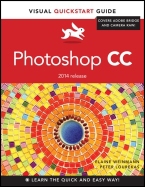
1. Visual Quickstart Guide: Photoshop CC 2016 release, By: Elaine Weinmann; Peter Lourekas, Publisher: Peachpit Press, Pub. Date: August 21, 2016, Print ISBN-10: 0-13-398046-4
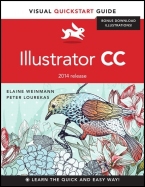
2. Illustrator CC: Visual QuickStart Guide (2016 release), By: Elaine Weinmann; Peter Lourekas, Publisher: Peachpit Press, Pub. Date: September 11, 2016, Print ISBN-10: 0-13-398703-5

This course requires that you watch Lynda.com videos as assigned (available through myCI portal website: http://myci.csuci.edu)
- Media or online sources for saving your files and backing up work:
- A portable hard drive* (external USB drive for backups and extra storage)

*Always label your media with your name and phone number. Continually back up your work, at school and at home, especially any work you put on the Art Program server. Please be reminded that everything on this server is cleared off at the end of every semester.
Required Software
This course requires that you have access to Adobe Photoshop and Adobe Illustrator:
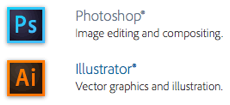

If you are interested in purchasing a computer know that as a student you can get a discount on a Mac or PC. Some examples:
Apple Store

Article on best PCs for students
A graphics tablet such as a Wacom® tablet.
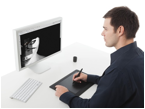
A graphics tablet or digitizer is a computer input device that enables a user to hand-draw images and graphics; similar to the way a person draws images with a pencil and paper.
A notebook/sketchbook or folder for collecting inspirational photos, drawings and for sketching ideas.

Attendance & Participation: 10%
Fruit-bug Project: 20%
UCLA in-class Assignment: 5%
Midterm Album Project: 20%
Backskull in-class Assignment: 5%
Polygon portrait in-class Assignment: 5%
Scott Hansen in-class Assignment: 5%
Final Project 30%
- Monday, Sept. 5, 2016, Labor Day holiday; campus closed, no class
- Friday, November 11, 2016, Veteran's Day Holiday; campus closed
- Thursday–Saturday, November 24-26, 2016, Thanksgiving Recess; campus closed
- Art 108 final exam* (critique) is Wednesday, December 14, 8:00-10:00 AM in Topanga 1976
*Attendance is mandatory for the final critique--non-attendance as well as being late can lead to a lowered or failing grade for the final project.
I will not permit students to use classroom computers for purposes other than assignments and work done in and for this class.
Your participation, you may be asked to leave the class and your overall grade will be lowered if you participate in the following activities during class:
- Random web surfing not related to class activities, e-mailing, texting, listening to music with earphones, messaging, playing games online, answering cell phones, and working on assignments for other classes. Please turn off all cell phones before arriving to class.
- Disruptive talking is very distracting to the instructor and your fellow students and will not be tolerated.
- Student conduct, which disrupts the learning process, shall not be tolerated and may lead to disciplinary action and/or removal from class.
If you have a disability kindly identify yourself to me so that you can receive reasonable accommodation for learning and evaluation. CSUCI is committed to equal educational opportunities for qualified students with disabilities in compliance with Section 504 of the Federal Rehabilitation Act of 1973 and the Americans with Disabilities Act (ADA) of 1990. The mission of Disability Accommodation Services is to assist students with disabilities to realize their academic and personal potential.
Students with disabilities needing accommodations should make requests to: Disability Resource Programs (DRP) located in the Educational Access Center, Bell Tower, Room 1541, email: accommodations@csuci.edu, phone: 805-437-3331 (V/TTY).
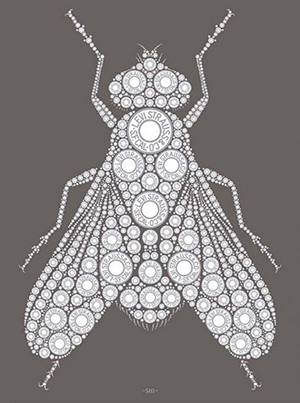
|
|




 click to download a pdf of the syllabus
click to download a pdf of the syllabus

 a flash drive*
a flash drive*
![]()
![]()






